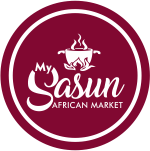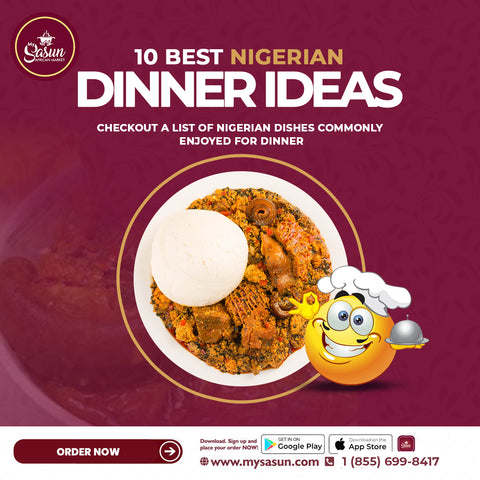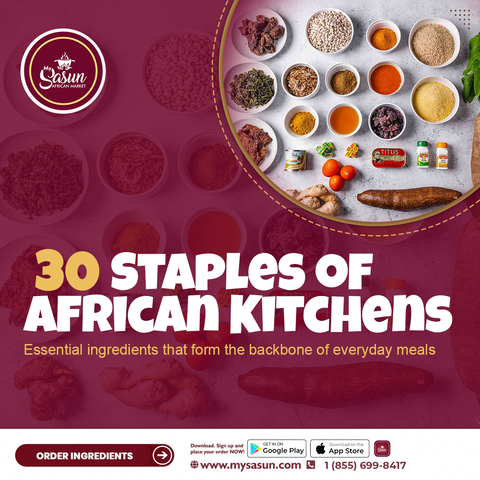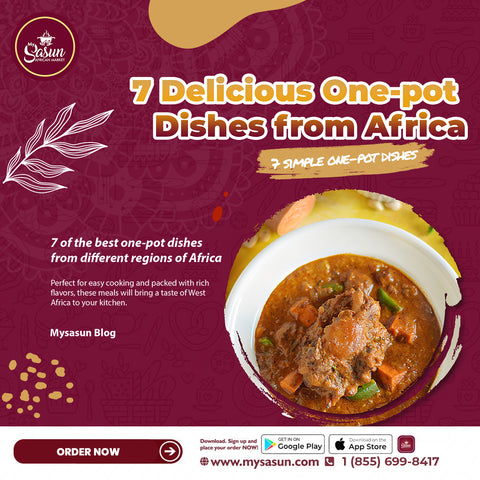When it comes to a typical Nigerian dinner, the meals are hearty, full of flavour, and often eaten as a family. Dinner in Nigeria is not just about mere eating but about enjoying bold spices, rich flavours, and nourishing dishes that satisfy both the stomach and the soul. While dinner ideas differ from home to home, here’s a list of 10 real Nigerian dishes commonly enjoyed for dinner:
Also Read: 11 Must-Try African Vegan Dishes
1. Pounded Yam and Egusi Soup

One of the most popular Nigerian meals, pounded yam with Egusi soup is a must-have for dinner. Pounded yam is smooth, stretchy, and served alongside Egusi soup, which is made from ground melon seeds, vegetables, and either beef, goat meat, or fish.
Ingredients:
- Yam (or pounded yam flour)
- Egusi (melon seeds)
- Palm oil
- Bitterleaf or spinach
- Goat meat or beef
How It's Served: Pounded ya m is molded into small balls and dipped into the rich, savoury Egusi soup.
2. Eba and Okra Soup

Eba (made from garri, which is dried grated cassava) is a popular Nigerian side that pairs well with Okra Soup. Okra soup is thick and hearty, often made with meat, fish, or seafood and spiced with indigenous seasonings.
Ingredients:
- Garri (cassava flakes)
- Fresh okra
- Palm oil
- Goat meat, stockfish, or beef
- Crayfish
How It's Served: Eba is rolled into balls and dipped into the slimy yet delicious Okra Soup.
Also Read: Top African Rice Dishes You Must Try
3. Jollof Rice and Fried Plantain

No Nigerian dinner is complete without Jollof Rice, a beloved one-pot dish made with rice, tomatoes, onions, and spices. It’s often served with fried plantains (dodo) and grilled chicken or fish for a full meal.
Ingredients:
- Parboiled rice
- Tomatoes, bell peppers, and onions
- Tomato paste
- Fried plantain
- Grilled chicken or fish
How It's Served: A hearty plate of Jollof rice with fried plantains and your choice of meat or fish.
4. Amala and Ewedu Soup with Gbegiri

Amala is a traditional Nigerian swallow made from yam flour, usually dark brown in colour. It's often paired with Ewedu (a slippery green soup made from jute leaves) and Gbegiri (a smooth, yellow bean soup made from peeled black-eyed beans).
Ingredients:
- Yam flour (elubo) for Amala
- Jute leaves (Ewedu)
- Black-eyed beans for Gbegiri
- Assorted meats or goat meat
How It's Served: Amala is served with a generous helping of Ewedu and Gbegiri, often with a side of assorted meats.
Also Read: Three Flavorful Coconut Dishes You Should Try
5. Porridge Yam (Asaro)

Asaro, or yam porridge, is a comforting dish made from chunks of yam cooked with palm oil, tomatoes, and spices. The result is a deliciously creamy dish, often enhanced with dried fish, crayfish, or stockfish.
Ingredients:
- Yam
- Palm oil
- Tomatoes and onions
- Dried fish or stockfish
- Crayfish
How It's Served: It’s typically served as a one-pot meal, with tender yam chunks infused with a rich tomato sauce.
6. Eba and Bitterleaf Soup (Ofe Onugbu)

From the eastern part of Nigeria, Bitterleaf Soup (Ofe Onugbu) is made with freshly washed bitter leaves, thickened with cocoyam, and cooked with meat or fish. It’s commonly eaten with Eba or Pounded Yam.
Ingredients:
- Garri for Eba
- Bitterleaf
- Palm oil
- Cocoyam
- Assorted meats or dried fish
How It's Served: Ofe Onugbu is rich and slightly bitter, best paired with Eba or pounded yam.
Also Read: 10 Authentic West African Beef Dishes You Must Try
7. Rice and Stew

This is a staple Nigerian dinner: white rice served with a rich tomato-based stew. The stew is usually made with chicken, beef, goat, or fish, spiced with onions, garlic, thyme, and curry powder.
Ingredients:
- White rice
- Tomatoes and tomato paste
- Chicken, beef, or goat meat
- Spices like thyme, curry powder, and bay leaf
How It's Served: A generous helping of white rice topped with spicy stew and your choice of protein.
8. Banga Soup and Starch

Banga soup is a delicacy from the Niger Delta region, made from palm nut extract, seasoned with traditional spices like oburunbebe stick. It’s usually eaten with starch or garri.
Ingredients:
- Palm fruit concentrate (Banga)
- Oburunbebe stick
- Catfish or goat meat
- Bitterleaf
How It's Served: This rich, oily soup is best paired with starch, which is a smooth, stretchy accompaniment made from cassava starch.
Also Read: 15 Must-Try Nigerian Dishes That Will Blow Your Mind
9. Nkwobi

Nkwobi is a special Nigerian dish made with cow feet, cooked in a spicy palm oil sauce, and seasoned with traditional spices like ehuru (calabash nutmeg). It’s often eaten as an evening treat.
Ingredients:
- Cow feet
- Palm oil
- Potash (to thicken the sauce)
- Ehuru (calabash nutmeg)
How It's Served: Usually served in a small wooden bowl, Nkwobi is eaten with your hands, and it's perfect for a relaxed evening meal.
10. Moi Moi and Rice

Moi Moi is a steamed bean pudding made from blended and peeled black-eyed beans. It’s a favourite Nigerian dinner option, often served with rice or enjoyed on its own with a side of vegetables.
Ingredients:
- Black-eyed beans
- Palm oil
- Red bell peppers and onions
- Seasoning cubes
- Boiled eggs or fish (optional)
How It's Served: Moi Moi can be served alongside rice or eaten alone with a vegetable garnish.
Also Read: Top 13 Traditional Nigerian Breakfast Dishes You Need to Try
Tips for a Good Nigerian Dinner Time:
1. Plan Ahead for Traditional Dishes:
Many Nigerian dishes, like pounded yam and egusi soup, require a bit of preparation, so it’s a good idea to plan ahead. You can soak beans for moi moi or prepare stock the night before to save time.
2. Use Fresh Ingredients Whenever Possible:
Fresh vegetables like spinach, okra, and tomatoes, as well as herbs like scent leaves, give your dishes a richer, more authentic flavour. Buying fresh produce ensures your meal tastes vibrant and delicious.
3. Stock Up on Nigerian Pantry Staples:
Make sure you always have essentials like palm oil, stock cubes, dried fish, and crayfish on hand. These ingredients are used in many Nigerian dishes, and having them ready will make it easier to whip up a traditional meal.
4. Balance Your Flavours:
Nigerian cuisine is known for its bold and spicy flavours. If you’re new to cooking Nigerian food, start by balancing spice with sweetness or starch. Dishes like jollof rice pair well with mild sides like fried plantains to balance the heat.
Also Read: Canilla Parboiled Rice: Your Secret Ingredient for Perfect West African Rice Dishes
5. Cook in Batches:
Many Nigerian meals like stews, soups, and rice dishes are perfect for batch cooking. Make larger quantities and freeze portions for later in the week. This is especially helpful for labour-intensive dishes like banga soup or ayamase.
6. Master the “Swallow” Technique:
"Swallows" like eba, pounded yam, or amala are a central part of Nigerian dinners. The key is achieving the right consistency—smooth, not too hard, and not too soft. Keep practicing to master your technique! And so that you can have
7. Have your Dinner Early:
Eating dinner early gives your body plenty of time to digest the food before you go to bed. Large meals, especially those rich in carbohydrates and fats, take time to break down. If you eat late and then lie down soon after, it can lead to indigestion, heartburn, and even acid reflux. By eating early, you allow your body to process the food more efficiently, leading to better overall digestion and comfort. Try to have dinner at least 2-3 hours before bedtime to give your body enough time to digest.
Conclusion
For dinner in Nigeria, you can choose your choice- you can decide to settle for a simple dish like rice and stew or something more elaborate like Banga soup- no matter what, these meals will satisfy your cravings for authentic Nigerian flavours and be just right for the night. At My Sasun African Market, you can find all the ingredients you need to prepare these delicious dinners so you can enjoy the comfort and warmth of Nigerian food right at your home.
Frequently Asked Questions (FAQs)
-
What is the most common Nigerian dinner?
One of the most common Nigerian dinners is pounded yam paired with a soup like egusi, bitterleaf, or okra soup. These hearty meals are filling and nutrient-rich, making them popular choices across the country.
-
What are "swallows" in Nigerian cuisine?
"Swallows" are starchy sides like pounded yam, eba, amala, or fufu. They are called "swallows" because they are traditionally eaten by forming the dough into a small ball, dipping it in soup, and swallowing without (or with minimal) chewing.
-
How do I reduce the spiciness of Nigerian dishes?
To reduce the spiciness, you can lower the amount of pepper in recipes and add more mild ingredients like tomatoes or bell peppers. Pairing spicy dishes with mild sides like fried plantains, white rice, or yam can also balance the heat.
-
What’s the difference between fufu and pounded yam?
Pounded yam is made by boiling yams and pounding them into a smooth dough, while fufu is made by fermenting cassava and sometimes plantains, then pounding them into a similar dough-like consistency. Both are popular "swallows" in Nigerian cuisine.
-
Can I make Nigerian dinners vegan or vegetarian?
Yes! Many Nigerian dishes can be adapted for vegan or vegetarian diets. For example, moi moi (bean pudding), yam porridge, and vegetable soup made with spinach or other leafy greens are plant-based. You can substitute meat with mushrooms or tofu in stews.
-
Where can I find the ingredients for Nigerian meals?
You can find authentic Nigerian ingredients like palm oil, garri, stockfish, egusi, crayfish, and indigenous spices at My Sasun African Market. These staples are essential for recreating traditional Nigerian dishes at home.







Comments (5)
I would never have believed that cold sore herpes virus can be cured with ancient herbal medicine because I just tested negative for the second time since I finished drinking the medicine a herbal doctor sent to me, all the sores and blisters were gone immediately I started drinking the herbal meds, so I want you all to know that herpes virus can be cured with the right use of ancient herbal medicine so visit this herbalist called doctor excel on his Email: drahonsie00@gmail.com / WhatsApp: +2348039482367. https://drahonsie002.wixsite.com/dr-ahonsie https://www.facebook.com/drstellaherbalhome?mibextid=ZbWKwLThanks
Hello everyone, i have a very important information about herpes virus, i was a victim of hsv1&2 until i met doctor Ahonsie, it still feels like a dream to me. it has been two years now, i have not experience any breakout of herpes. I new about him through a post made on social media, a lady shares her experience and then i decided to contact him and ever since i contacted i was encourage and with no doubt i was cured from herpes simplex in just two weeks. He also treat other illnesses like HPV, HIV, CANCER, THYRIOD, PENIS ENLARGEMENT, and more contact him via Email: drahonsie00@gmail.com / WhatsApp: +2348039482367. https://drahonsie002.wixsite.com/dr-ahonsie https://www.facebook.com/drstellaherbalhome?mibextid=ZbWKwLThanks
My purpose out here today is to share this article to the world about how Doctor Odunga helped me in getting back my EX-boyfriend who broke up with me 4 months ago. I tried all I could to make him see reasons with me so that we can continue our relationship but he denied me. Thank God for giving me the thought of going into the internet for help, I searched properly and I saw different reviews of Doctor Odunga and I insisted on giving it a try by contacting him via what’s app on (+2348167159012). He gave me reason to live again and he prepared a spell and told me that my Ex-boyfriend will come back to me within 11 hours. Can you believe it, my EX-boyfriend came back to me, proposed to me and our wedding will be held soon. Contact him now!!! if you need any help. Email: odungaspelltemple@gmail.com and he does a lot of spells. Once again i want to say am very grateful for your help
Am really grateful and thankful for what Dr Ahonsie has done for me and my family. I Was having HERPES for good three years with no solution, the diseases almost took my life and because I was unable to work and I was also loosing lots of money .for medication, but one faithful day when I went online, I met lots of testimonies about this great man so I decided to give it a try and to God be the glory he did it. he cured me of my diseases and am so happy and so pleased to Write about him today. if you need his help or you also want to get cured just the way I got mine, just email him below drahonsie002@gmail.com You can also call or whatsApp his telephone number on +2348039482367. https://drahonsie002.wixsite.com/dr-ahonsie https://www.facebook.com/drstellaherbalhome?mibextid=ZbWKwLThanks once again Dr Ahonsie.
My heart is so filled with joy. If you are suffering from Erectile dysfunction or any other disease you can contact Dr. Moses Buba on this buba.herbalmiraclemedicine@gmail.com or His website : https://www.facebook.com/profile.php?id=61559577240930 . For more information from me reach me via WhatsApp : +44 7375 301397